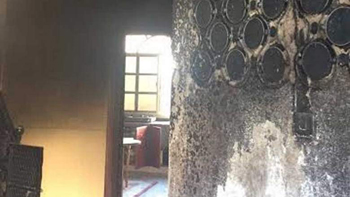Ras Al Khaimah, Dec 12: A 57-year old Arab woman succumbed to fatal injuries and burns she received in a big fire that erupted in her house here in the emirate of Ras Al Khaimah early on Sunday.
 The victim's 62-year-old husband was 90 to 100 per cent burnt due to the massive flames which engulfed the entire house, and totally damaged some rooms in the house.
The victim's 62-year-old husband was 90 to 100 per cent burnt due to the massive flames which engulfed the entire house, and totally damaged some rooms in the house.
The central operations room of the RAK Police, having been alerted of the accident, immediately dispatched ambulances and paramedics to the site in a record time.
The man, his wife and 27-year-old son, who was slightly injured due to the inferno, were rushed to the Saqr hospital for treatment and medical care, according to medical sources.
"Though the woman admitted to the intensive care unit, she could not make it, and breathed her last shortly whereas her husband is still in critical condition."
Brigadier Abdullah Khamis Al Hadidi, deputy chief commandant of the RAK police, late on Sunday said the civil defence department was alerted about the fire at around 7.30 am.
"The trio; wife, husband, and son were rushed to the hospital for treatment and medical care."
A number of civil defence vehicles and firefighters were summoned to the scene to collaborate in putting out the huge fire.
"They managed to contain the flames before spreading to nearby houses, and cool down the house to prevent the fire from starting again."
Brig Al Hadidi affirmed that investigations are still underway to identify the reasons behind the fire. "A CID team has been formed to collect all possible evidence to find out the motives behind the mishap, if any."





Comments
Add new comment